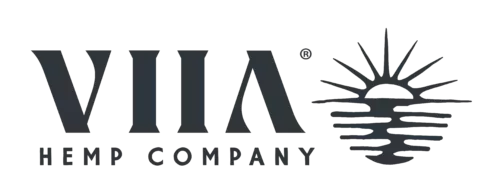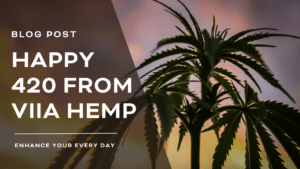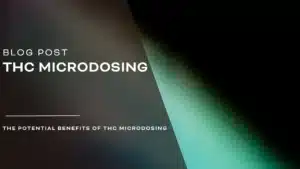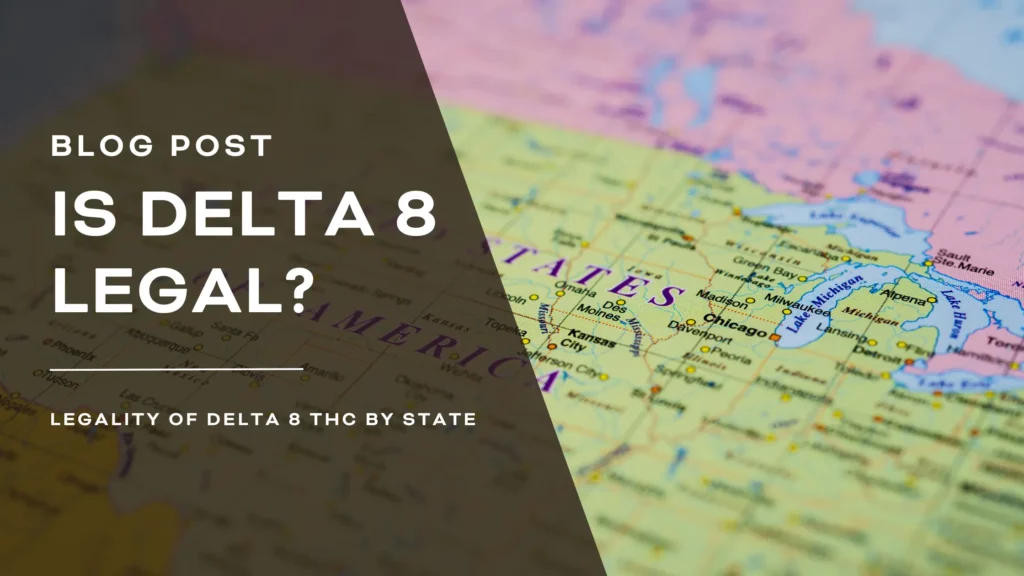
Table of Contents
From being virtually unknown to becoming a widespread product offering from the biggest and smallest CBD brands in the last 2 years— the rise of delta-8 THC has been swift. But is delta-8 THC legal?
The short answer is “In most states.” The long answer is a little more complicated, but we’ll break it down for you.
Basically, there are no specific federal laws that address delta-8 THC specifically, so it’s up to the discretion of local law enforcement officials and prosecutors to decide whether or not to pursue charges against someone caught with delta-8 THC.
For the most part, delta-8 THC products, especially those made from legal hemp, are not on the radar of law enforcement. As a result, delta-8 THC lives in a legal gray area.
In this article, we’ll guide you through everything you need to know about delta-8 THC, including where it comes from, some of its effects, its complicated legal status, and how to shop for high-quality delta-8 products.
Article Summary
When it comes to cannabis laws, there’s always a lot to unpack, so if you’re pressed for time and want to get to the heart of it all, here are the highlights:
- Delta-8 tetrahydrocannabinol (delta-8 THC) is a naturally occurring compound in the cannabis plant. It’s one of the few chemicals from the plant that produces a psychoactive effect.
- Delta-8 THC is an isomer to delta-9 THC, which means they have the same chemical components with a different arrangement of atoms. As a result, they both produce psychoactive effects but with slightly different characteristics.
- Delta-8 THC products from hemp plants are considered federally legal as it’s considered a distinct compound from delta-9 THC from marijuana plants.
- The legal landscape of delta-8 and delta-9 varies by state. However, many states still have access to hemp-derived products (the same way you can purchase CBD products) as long as it remains under the 0.3% delta-9 THC content by dried weight threshold.
Federal Legal Status of Delta-8 THC
The million-dollar question: is delta-8 THC federally legal in the U.S.?
Technically, there’s no rule against it, but it’s not exactly clear-cut. At the federal level, no law directly mentions or prohibits Delta 8 THC. This is where things get a bit murky, landing us in this gray area of legality.
Here’s the interesting part: according to the 2018 Farm Bill, hemp and its derivatives containing less than 0.3% delta-9 THC are legal.
Many people interpret this to mean that if delta-8 THC is made from the hemp plant, it’s A-OK.
And for the most part, this seems to be the case. However, not everyone agrees, and different enforcement agencies might interpret the laws in their own ways.
So yes, it’s a bit of a puzzle, but right now, people tend to lean towards the idea that delta-8 THC is federally legal—as long as it’s derived from hemp. That being said, always make sure to keep up with the latest updates because the legal landscape around cannabis is constantly evolving.
Is Delta-8 Legal In My State?
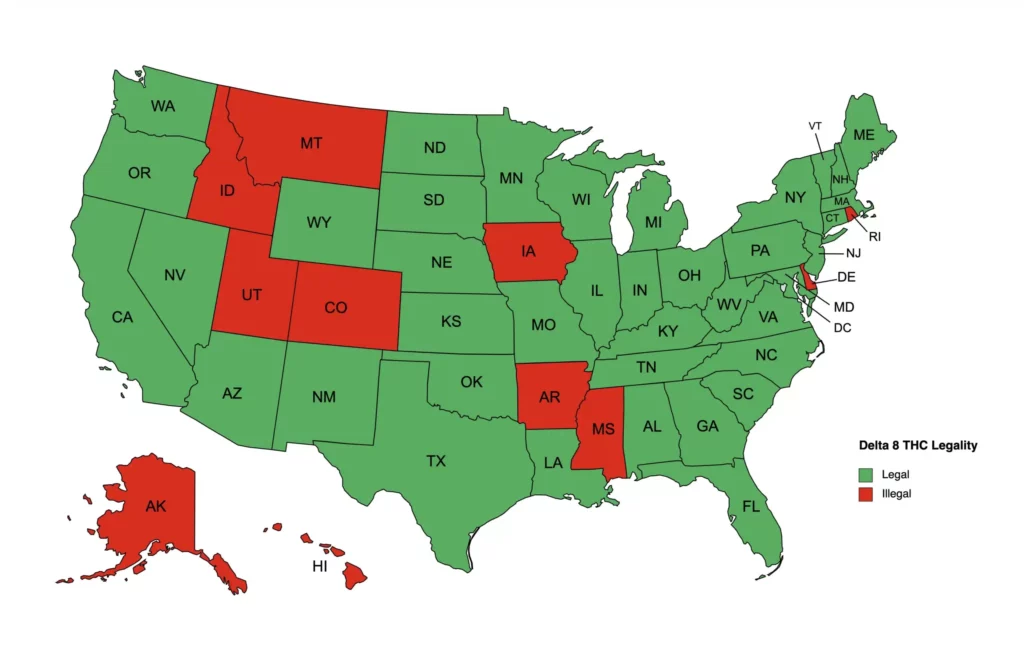
| State | Legality | Info |
|---|---|---|
| Alabama | Legal | While Alabama maintains a conservative stance on marijuana, delta-8 THC is currently legal. This is because the state’s controlled substances list does not mention delta-8 THC, and the 2018 Farm Bill, which allows for hemp derivatives with less than 0.3% delta-9 THC, prevails. |
| Alaska | Illegal | Alaska has legalized marijuana for both medical and recreational use, but the sale and use of delta-8 THC is currently prohibited. This is due to state regulations that control the production, marketing, and safety standards of all industrial hemp and hemp derivatives. |
| Arizona | Legal | Arizona legalized marijuana for recreational use in November 2020, which means that adults can freely purchase and use THC products, regardless of whether they’re derived from hemp or marijuana. This includes delta-8 THC. |
| Arkansas | Illegal | While hemp and CBD are legal in Arkansas in line with federal law, the state has made modifications to the hemp laws regarding all THC variations. Even if the final product contains less than 0.3% delta-9 THC by dried weight and is derived from Farm Bill-compliant hemp, it’s still considered illegal. |
| California | Legal | Despite being known for its liberal marijuana laws, California does not have any specific legislation regarding delta-8 THC. However, it’s assumed legal due to its derivation from hemp as per the 2018 Farm Bill. |
| Colorado | Illegal | Although Colorado was one of the first states to legalize recreational marijuana, delta-8 THC is currently illegal. This is due to state regulations concerning synthesized cannabinoids, regardless of whether they’re derived from hemp. |
| Connecticut | Legal | Marijuana is legal here for medical use and soon to be for recreational use. The lack of specific legislation against delta-8 allows the compound to be governed by the 2018 Farm Bill. |
| Delaware | Illegal | Marijuana is only legal for medical use, and delta-8 THC is currently illegal in Delaware. This is due to state laws that ban all tetrahydrocannabinols, not specifically exempting delta-8 THC derived from hemp. |
| Florida | Legal | In Florida, medical marijuana is legal, and delta-8 THC is also legal. The state’s law respects the federal law, allowing for hemp derivatives, such as delta-8 THC, with less than 0.3% delta-9 THC. |
| Georgia | Legal | Marijuana remains illegal without a specific medical license, but delta-8 THC is legal. The state follows the 2018 Farm Bill regarding hemp derivatives, and there are no specific laws against delta-8 THC. |
| Hawaii | Illegal | Despite having legalized medical marijuana, Hawaii currently deems delta-8 THC illegal. This is due to state regulations that classify delta-8 THC as a harmful drug, regardless of its source. |
| Idaho | Illegal | Idaho is one of the few states where marijuana and all its derivatives remain illegal, and delta-8 THC is also illegal. The state has some of the strictest cannabis laws in the country. |
| Illinois | Legal | In Illinois, where recreational cannabis is legal, delta-8 THC is also legal. The state has not made any specific regulations against the sale or use of delta-8 THC, so it falls under the 2018 Farm Bill’s jurisdiction. |
| Indiana | Legal | Indiana has no specific laws against delta-8 THC, meaning its legality falls under federal jurisdiction. The 2018 Farm Bill allows for the sale and use of hemp derivatives, like delta-8 THC, with less than 0.3% delta-9 THC. |
| Iowa | Illegal | In Iowa, all forms of THC, including delta-8, are illegal regardless of their source. The state has stringent marijuana laws, allowing only a limited medical cannabis program. |
| Kansas | Legal | Kansas has no specific legislation against delta-8 THC, which means it’s technically legal under the 2018 Farm Bill. However, marijuana remains illegal in the state. |
| Kentucky | Legal | While marijuana is illegal in Kentucky, delta-8 THC falls into a gray area due to the 2018 Farm Bill. It’s currently legal in the state as long as it’s derived from hemp and contains less than 0.3% delta-9 THC. |
| Louisiana | Gray Area | Delta 8 THC is legal in Louisiana, but there are restrictions on inhalable and consumable hemp products. Only edible delta-8 THC products derived from hemp plants with less than 0.3% delta-9 THC are legal, but smokable delta-8 products (delta-8 flower and vape cartridges) remain a controlled substance. |
| Maine | Legal | Both recreational marijuana and delta-8 THC are legal in Maine. The state has no specific legislation against Delta-8 THC, allowing its legality to be governed by the 2018 Farm Bill. |
| Maryland | Legal | Medical marijuana is legal here, and the state doesn’t have any specific laws against delta-8 THC. It falls under the jurisdiction of the 2018 Farm Bill, which allows for hemp derivatives with less than 0.3% delta-9 THC. |
| Massachusetts | Legal | Adults can enjoy marijuana legally for recreational use in Massachusetts, which also allows for the use and sale of delta-8 THC. There are no specific laws against delta-8 THC, so it falls under the 2018 Farm Bill’s jurisdiction. |
| Michigan | Legal | Marijuana is legal for recreational use in Michigan, and the state has no specific legislation against delta-8 THC. This means that the compound’s legality falls under the jurisdiction of the 2018 Farm Bill. |
| Minnesota | Legal | Marijuana is only legal for medical use in Minnesota, but the state doesn’t have specific laws against delta-8 THC. It falls under the jurisdiction of the 2018 Farm Bill, which allows for hemp derivatives with less than 0.3% Delta-9 THC. |
| Mississippi | Illegal | Marijuana is illegal without a stringent medical license in the state of Mississippi and also classifies delta-8 THC as illegal. The state has a broad definition of marijuana, which includes all tetrahydrocannabinols, irrespective of their source. |
| Missouri | Legal | Only medical marijuana is legal in Missouri, but it has no specific laws against delta-8 THC. The legality of delta-8 THC is governed by the 2018 Farm Bill, which allows for hemp derivatives with less than 0.3% delta-9 THC. |
| Montana | Illegal | Despite having a medical marijuana program, Montana has strict state laws that classify all forms of THC, including delta-8, as illegal regardless of their source. |
| Nebraska | Legal | Nebraska has stringent laws on cannabis but has exempted hemp-derived products from its list of controlled substances. However, state officials are still working to determine delta-8 THC’s legality, with one governor who is notoriously anti-cannabis potentially influencing delta-8’s future legal status in the state. |
| Nevada | Legal | Marijuana is legal for both medical and recreational use in Nevada, and delta-8 THC is also legal. The state has not made any specific regulations against the sale or use of delta-8 THC, so it falls under the 2018 Farm Bill’s jurisdiction. |
| New Hampshire | Legal | Marijuana is legal for medical use, and has no specific laws against delta-8 THC. It falls under the jurisdiction of the 2018 Farm Bill, which allows for hemp derivatives with less than 0.3% Delta-9 THC. |
| New Jersey | Legal | Adults can enjoy marijuana legally for medical and recreational use in New Jersey, The state has no specific legislation against Delta-8 THC. The state allows the compound’s legality to be governed by the 2018 Farm Bill. |
| New Mexico | Legal | In New Mexico, where medical marijuana is legal, delta-8 THC is also considered legal due to no specific legislation against it. The state respects the 2018 Farm Bill, allowing for hemp derivatives, such as delta-8 THC, with less than 0.3% delta-9 THC. |
| New York | Legal | Marijuana is legal for both medical and recreational use in New York. The state also allows for the sale and use of delta-8 THC. There are no specific laws against delta-8 THC, so it falls under the 2018 Farm Bill’s jurisdiction. |
| North Carolina | Legal | Marijuana remains illegal in North Carolina without a specific medical license, however North Carolina has no specific laws against delta-8 THC. It falls under the jurisdiction of the 2018 Farm Bill, which allows for hemp derivatives with less than 0.3% Delta-9 THC. |
| North Dakota | Legal | Only medical marijuana is legal here, and the state does not have any specific laws against delta-8 THC. The legality of delta-8 THC is governed by the 2018 Farm Bill. |
| Ohio | Legal | Medical marijuana is legal in Ohio, and there are no specific laws against delta-8 THC. As such, its legality falls under the jurisdiction of the 2018 Farm Bill, which permits hemp derivatives with less than 0.3% Delta-9 THC. |
| Oklahoma | Legal | While recreational cannabis is illegal, medical marijuana is legal. Oklahoma also allows for the use and sale of delta-8 THC. The state has no specific laws against Delta-8 THC, so it falls under the 2018 Farm Bill’s jurisdiction. |
| Oregon | Legal | Adults can enjoy marijuana legally for both medical and recreational use in Oregon. The state has no specific legislation against delta-8 THC. The state allows the compound’s legality to be governed by the 2018 Farm Bill. |
| Pennsylvania | Legal | Medical marijuana is legal, and delta-8 THC is also legal in Pennsylvania. There are no specific laws against delta-8 THC, allowing its legality to be governed by the 2018 Farm Bill, which permits hemp derivatives with less than 0.3% Delta-9 THC. |
| Rhode Island | Illegal | Despite having a medical marijuana program, Rhode Island has specific legislation that classifies all forms of THC, including delta-8, as illegal regardless of their source. |
| South Carolina | Legal | Marijuana is illegal without a specific medical license, but South Carolina doesn’t have specific laws against delta-8 THC, which means it falls under the jurisdiction of the 2018 Farm Bill, which allows for hemp derivatives with less than 0.3% delta-9 THC. |
| South Dakota | Legal | South Dakota has strict cannabis laws. However, delta-8 THC is legal in South Dakota as long as it is sourced from industrial hemp with a delta-9 THC level of no more than 0.3%. The state has legalized all hemp products containing an acceptable level of delta 9-THC in accordance with the Farm Bill. |
| Tennessee | Legal | While marijuana remains illegal in Tennessee, delta-8 THC falls into a gray area due to the 2018 Farm Bill. As long as it’s derived from hemp and contains less than 0.3% delta-9 THC, it is currently legal in the state. |
| Texas | Legal | Medical marijuana is legal under strict conditions in Texas, and for the time being, delta-8 THC is also legal. The state has no specific laws against delta-8 THC, allowing its legality to be governed by the 2018 Farm Bill. |
| Utah | Illegal | Only medical marijuana is legal in Utah. The state has specific laws that classify all forms of THC, including delta-8, as illegal regardless of their source. |
| Vermont | Legal | Marijuana is legal for both medical and recreational use in Vermont. The state doesn’t have specific legislation against delta-8 THC. The state allows the compound’s legality to be governed by the 2018 Farm Bill. |
| Virginia | Legal | You can enjoy marijuana as an adult legally for both medical and recreational use. The state doesn’t have specific laws against delta-8 THC, which means it falls under the jurisdiction of the 2018 Farm Bill. |
| Washington | Legal | In Washington, where marijuana is legal for both medical and recreational use, delta-8 THC is also legal. The state has not made any specific regulations against the sale or use of delta-8 THC, so it falls under the 2018 Farm Bill’s jurisdiction. |
| West Virginia | Legal | Medical marijuana is legal in West Virginia. It doesn’t have specific laws against delta-8 THC. The legality of delta-8 THC is governed by the 2018 Farm Bill, which allows for hemp derivatives with less than 0.3% Delta-9 THC. |
| Wisconsin | Legal | Marijuana is illegal without a stringent medical license in Wisconsin, but it doesn’t have specific laws against delta-8 THC. It falls under the jurisdiction of the 2018 Farm Bill, which allows for hemp derivatives with less than 0.3% delta-9 THC. |
| Wyoming | Legal | The state of Wyoming has very strict laws when it comes to marijuana. However, delta-8 THC can be freely purchased in stores and from online retailers as long as it can be proven through proper labeling and testing that the product is hemp-derived and contains less than 0.3% THC. |
Just as a friendly reminder, the information given in this article serves purely to satisfy surface-level curiosity and should not be taken as sound legal advice. The laws regarding cannabis vary from each state and even from one municipality to the next, which means you should familiarize yourself with local laws before purchasing hemp-derived products that produce a psychoactive effect.
What Is Delta-8 THC?

Delta-8 tetrahydrocannabinol is a psychoactive compound found in cannabis plants (hemp and marijuana). However, it only naturally exists in very small quantities (less than 0.1%), making it a minor cannabinoid.
Delta-8 became popular as “light weed” because of its milder high compared to traditional THC. In comparison, delta-8 products are said to give people fewer chances of experiencing some of the discomforts from the marijuana high, such as racing thoughts and paranoia.
Some people say that delta-8 THC gives them a more clear-headed high, while others say it makes them feel more relaxed. The effects vary from person to person.
Delta-8 THC is available in various forms, such as the ones available for purchase on our site. This includes delta-8 as an oil, delta-8 THC gummies, and smokable products.
Discovery And Early Research Of Delta 8 in The Cannabis Sativa Plant
Although delta-8 seems like the cool new cannabinoid on the block, it’s been known about for a long time.
Delta-8 didn’t gain significant attention until Dr. Raphael Mechoulam, the famed Israeli organic chemist often called the ‘father of cannabis research,’ began his groundbreaking work in the 1960s.
Mechoulam and his team identified and synthesized an array of cannabinoids, including delta-8 and delta-9 THC, paving the way for a more nuanced understanding of the plant’s chemistry.
However, delta-8 THC, a less potent and less prevalent cannabinoid compared to its cousin delta-9, remained relatively under-studied due to its trace amounts in the plant and the overwhelming focus on the more psychoactive and abundant delta-9.
Over the decades, limited but promising research has highlighted delta-8 THC, which has ignited curiosity and spurred further research into its potential applications, all while grappling with an evolving legal landscape.
Is Delta-8 THC A Synthetic Cannabinoid?
Let’s tackle another hot question: is delta-8 THC a synthetic cannabinoid?
You might remember hearing about synthetic cannabinoids like K2 and Spice that caused public health crisis a few years back. Because of their severe health risks, the Drug Enforcement Administration (DEA) slammed down the gavel and made all synthetic cannabinoids illegal.
But does delta-8 THC fall into this synthetic category?
Well, it’s not quite that simple. Most delta-8 THC on the market is made in a lab because it exists in such small quantities naturally. While delta-8 is synthesized from CBD through a chemical process, it’s not synthetic in the same sense as K2 or Spice.
Those synthetic substances are concocted entirely in a lab and aren’t found naturally. Delta-8 THC, on the other hand, is a natural compound found in cannabis, albeit in small amounts.
Plus, it’s generally seen by medical professionals as safe, not causing the same sort of health issues that those illegal synthetic cannabinoids did.
However, the fact that delta-8 is produced via a chemical reaction from another compound (CBD) has sparked some legal debates in certain states.
Is it natural? Is it synthetic? It’s a bit of a head-scratcher, right? This ambiguity is causing some states to question its legal status, showing just how complex and fluid the world of cannabis legislation really is.




